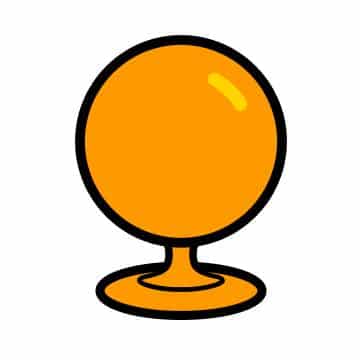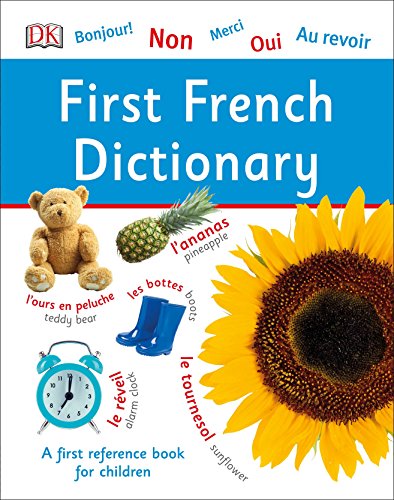Contents
- La Maison en Général (The House in General)
- Le Salon (Living Room)
- La Cuisine (Kitchen)
- La Salle à Manger (Dining Room)
- La Chambre (Bedroom)
- La Salle de Bains (Bathroom)
- Le Bureau (Home Office)
- La Blanchisserie (Laundry Room)
- Le Sous-sol (Basement)
- Why Study French House Vocabulary?
- Ways to Practice French House Vocabulary
- And one more thing...
156 French House Vocabulary Words

Wherever you may go, there really is no place like home. That’s why it’s important to know how to describe each individual room in your house, right down to the furniture it has.
In this post, you’ll find 156 essential French words that you can use to talk about your home, plus some useful resources for practicing French house vocabulary.
Download: This blog post is available as a convenient and portable PDF that you can take anywhere. Click here to get a copy. (Download)
La Maison en Général (The House in General)
Before we begin our room-by-room breakdown, let’s look at words for la maison en général (the house in general).
| French | English |
|---|---|
| la maison | house |
| chez | at/to the house (or place) of |
| la porte d’entrée | front door |
| la porte moustiquaire | screen door |
| la sonnette | doorbell |
| le portail | gate |
| le toit | roof |
| le grenier | attic (or granary) |
| le garage | garage |
| la pelouse | lawn |
| le jardin | garden (sometimes used as “backyard”) |
| en bas | downstairs |
| en haut | upstairs |
| au premier étage | on the second floor (American English); on the first floor (British English) |
| au rez-de-chaussée * | on the ground floor |
| un escalier | staircase / stairs |
| la copropriété | condominium |
| un appartement | apartment (American English); flat (British English) |
| le balcon | balcony |
| la terrasse | terrace |
| le cour | courtyard |
* La chaussée itself is the road or pavement, and le rez is the level. Therefore, this would be the floor of a building that is level with the street or sidewalk.
Now, we’ll lay out the blueprint for some of our favorite rooms in the house, along with common furnishings and household objects.
Le Salon (Living Room)
| French | English |
|---|---|
| le meuble | piece of furniture |
| le canapé | sofa / couch |
| le bout de canapé | end table |
| la lampe | lamp |
| le coussin | throw pillow / cushion |
| la causeuse | loveseat |
| le fauteuil / le fauteuil de salon | armchair |
| le fauteuil relax | recliner |
| la table basse | coffee table |
| la télé / la télévision | television |
| le poste de télévision | TV set |
| la télécommande | remote control |
| la magnétoscope numérique / l’enregistreur numérique | DVR (digital video recorder) |
| le lecteur de DVD | DVD player |
| la console de jeux vidéo | gaming console |
| la chaîne stéréo | stereo system |
| le haut-parleur | stereo speaker |
La Cuisine (Kitchen)
| French | English |
|---|---|
| la vaisselle | dishes |
| le lave-vaisselle | dishwasher |
| le four à micro-ondes / le micro-ondes | microwave |
| le grille-pain | toaster |
| le mixeur | mixer |
| le four | oven |
| la cuisinière | stove |
| la cocotte | cooking pot |
| la casserole | saucepan |
| la poêle | frying pan |
| la batterie de cuisine | pots and pans (collectively) |
| la cafetière | coffee maker |
| l’évier | kitchen sink |
| le réfrigérateur | refrigerator |
| le frigo / le frigidaire | fridge |
| le garde-manger | pantry |
| le placard | kitchen cabinet / cupboard |
| le plan de travail | countertop |
La Salle à Manger (Dining Room)
| French | English |
|---|---|
| la chaise | chair |
| la table | table |
| la nappe de table | tablecloth |
| le napperon / le set de table | placemat |
| la serviette | napkin |
| l’assiette | plate |
| la tasse | cup |
| une demitasse | a half-cup |
| le verre | glass |
| le dessous de verre | coaster |
| le couteau | knife |
| la fourchette | fork |
| la cuiller / la cuillère | spoon |
| la cuillère-fourchette / la spork | spork |
| les couverts | flatware |
| la vitrine | hutch / dish cabinet |
| le bar | liquor cabinet |
| le casier à bouteilles | wine rack |
| la bouteille de vin | bottle of wine |
| le pichet d’eau / la carafe d’eau | pitcher of water |
La Chambre (Bedroom)
| French | English |
|---|---|
| le lit | bed |
| le matelas | mattress |
| le sommier | box spring |
| le drap | sheet |
| le drap-housse / le drap contour | fitted sheet |
| le drap plat | flat sheet |
| la couverture | blanket |
| l’édredon | quilt |
| la couette | comforter (American English); duvet (British English) |
| l’oreiller | pillow |
| la taie d’oreiller | pillowcase |
| la table de chevet * | nightstand |
| la lampe de chevet | bedside lamp |
| le réveil | alarm clock |
| la coiffeuse | dresser |
| la boîte à bijoux | jewelry box |
| la commode | chest of drawers |
| la garde-robe | wardrobe |
| la penderie | closet |
*The term chevet means “bedside.” It can also be used in phrases like, Elle était restée au chevet de lui pendant qu’il était malade (She had stayed at his bedside when he was ill).
La Salle de Bains (Bathroom)
| French | English |
|---|---|
| le lavabo | sink |
| le robinet | faucet |
| la toilette | toilet |
| le papier-toilette | toilet paper |
| la douche | shower |
| la baignoire * | bathtub |
| le miroir | mirror |
| le peigne | comb |
| la brosse à cheveux | hairbrush |
| la brosse à dents | toothbrush |
| le dentifrice | toothpaste |
| le fil dentaire | dental floss |
| l’eau dentifrice / le bain de bouche | mouthwash |
| le shampooing | shampoo |
| l’après-shampooing / la crème démêlante | conditioner |
| le sèche-cheveux | hair dryer |
| le rasoir | razor |
| la crème à raser | shaving cream |
* Le bain is the bath you take while in la baignoire. Se baigner means “to bathe oneself” or “to have a bath.” It can also mean “to go swimming.”
Le Bureau (Home Office)
| French | English |
|---|---|
| le téléphone | telephone |
| le répondeur téléphonique | answering machine |
| la barre d’alimentation / la bande d’alimentation | power strip |
| la prise de courant | electrical outlet |
| le parasurtenseur / le limiteur de surtension | surge protector |
| la bibliothèque | bookshelf (also library) |
| l’écran | monitor |
| le fax / le télécopieur | fax machine |
| le clavier | keyboard |
| la souris | mouse |
| le tapis de souris | mousepad |
| l’ordinateur | computer |
| le classeur * | filing cabinet |
* Le classeur à feuillets mobiles is a ring binder, but le classeur by itself can be used to name the piece of furniture where you keep your dossiers (files) organized. This word is related to the verb classer , which means to classify, organize or file.
La Blanchisserie (Laundry Room)
| French | English |
|---|---|
| le lave-linge / la machine à laver | washer / washing machine |
| le détachant | stain remover |
| l’adoucissant | fabric softener |
| la lessive * | laundry detergent |
| l’eau de Javel | bleach |
| la sécheuse / le sèche-linge | dryer |
| la feuille assouplissante | dryer sheet |
| le cintre | clothes hanger |
| le panier à linge | clothes basket |
* Faire la lessive means to do laundry. The laundry itself is le linge . Laver le linge means to wash dirty laundry. It’s also used in the expression laver la linge sale en famille , which means to not air one’s dirty laundry in public.
Le Sous-sol (Basement)
| French | English |
|---|---|
| le fourneau | furnace |
| le chauffe-eau | water heater |
| le disjoncteur | circuit breaker |
| un atelier | workshop |
Why Study French House Vocabulary?
Whether you’re a beginner French student or several years into your French-learning quest, these household words will come in handy. Here’s why:
Universal and practical
When you learn French house vocabulary, you empower yourself with words to describe your life.
Home is a concept that’s near and dear to people’s hearts. It’s part of la vie quotidienne (everyday life).
Household life is a relatable topic. So, if you need to make small talk in French and you’re sick of talking about the weather, delve into your knowledge of house vocabulary to propel the conversation forward.
“At home” for beginners
French house vocabulary will help beginning learners feel more “at home” with the French language.
This fundamental vocab covers concrete concepts that you can immediately relate to. After all, what’s closer to home than talking about the rooms and objects in your own abode?
Home again for intermediate learners
If you’re an intermediate French learner, studying these words will give you a chance to review what may now be long-lost vocab.
You may have progressed into advanced grammar and moved far beyond bonjour (hello), but unless you get daily French conversation practice, chances are good that a few of these words may have slipped your mind.
And, even in your native language, there will always be words you haven’t encountered yet. It can’t hurt to refresh your memory or learn new vocab.
Ways to Practice French House Vocabulary
As all language learners know, just skimming vocab lists is not enough to make new words stick in your long-term memory.
Here you’ll find a few of the best ways to help you learn, practice and retain this vocabulary.
1. Get inQUIZitive
Try out a few fun quizzes to test your vocabulaire de la maison (house vocabulary) mettle.
Sporcle

Known for five or 10-minute quizzes on just about any topic, Sporcle has several French-language options.
Quizlet
Quizlet offers multiple approaches to practicing and learning French house vocabulary. Try photo flashcards, multiple-choice or fill-in-the-blank questions. Test your listening and spelling skills with audio and writing exercises. Try out these various French house vocab collections.
Quiz-Tree.com
This site offers a range of multiple-choice questions that’ll test your knowledge of French household words. The words are read aloud in French, and then you can choose from four possible answers.
2. APPly yourself
Here are a couple of apps for you to use to cement your knowledge of French house vocabulary.
Memrise (iOS / Android)
Watch your mastery of French house words grow with Memrise. Once you’ve learned the words, challenge yourself with the Speed Review.
Based on spaced repetition and a combination of multiple-choice questions, putting words in the correct order and typing out target words, Memrise shows your progress with each word or phrase. Progress is displayed as a newly planted seed, a seedling and a flower in full bloom.
- “Around the House” section in the “Introductory French Vocab” course
- “French Home, House Vocabulary” course
See our full review of Memrise here.
Language Lab by McGraw-Hill (iOS / Android)

The “French Vocabulary Drills” title has a section called À la maison (House and home) where you’ll be able to practice some key French house vocabulary using flashcards.
3. Get the picture

Embellished with photographs or simple drawings, you’re sure to find a dictionary that suits your style. Look for bilingual or French-only choices, depending on your learning level.
DK’s “First French Dictionary” has three chapters illustrating words used in la cuisine (kitchen), ma chambre (my bedroom) and la salle de bain (bathroom). The photos on each page are labeled with their names in French, along with English-language translations.
4. Watch cool videos
A great way to memorize vocab is to hear it used by native speakers in authentic contexts, which you can easily do by watching videos.
But where to find French videos? Pretty much anywhere you’d normally watch videos! If you use French search terms on YouTube, you can find all sorts of content from native speakers about any topic you can imagine, whether you’re interested in recipes or video games. This way, you’ll learn vocab about things that interest you!
If you’re looking for French videos combined with language learning support, you could try an immersive language learning program like FluentU.
FluentU takes authentic videos—like music videos, movie trailers, news and inspiring talks—and turns them into personalized language learning lessons.
You can try FluentU for free for 2 weeks. Check out the website or download the iOS app or Android app.
P.S. Click here to take advantage of our current sale! (Expires at the end of this month.)
5. Use DIY sticky notes
One useful way to start memorizing French house vocabulary is to see it around you.
Get a pack of your favorite sticky notes and spend a little time labeling various items in your house. Or, if you’re not into DIY projects, there are plenty of pre-made French labels out there for purchase. Every time you look around, you’ll be reminded of your French household vocabulary.
6. Re-design your vocab
Intermediate and advanced French learners who enjoy home design can practice their French house vocabulary by reading about la décoration intérieure (interior decorating) in French periodicals.
Try the DIY Déco section of Marie Claire or the Pièce par Pièce (Room by Room) section of Le Journal de la Maison (The House Journal) for starters.
Be it ever so humble, there’s nothing like French house vocabulary.
You can use it wherever you may roam, near or far from home.
Download: This blog post is available as a convenient and portable PDF that you can take anywhere. Click here to get a copy. (Download)
And one more thing...
If you like learning French vocabulary on your own time and from the comfort of your smart device, then I'd be remiss to not tell you about FluentU.
Other sites use scripted content. FluentU uses a natural approach that helps you ease into the French language and culture over time. You’ll learn French as it’s actually spoken by real people.
FluentU has a wide variety of great content, like interviews and web series, as you can see here:

FluentU brings native videos within reach with interactive subtitles.
You can tap on any word to look it up instantly. Every definition has examples that have been written to help you understand how the word is used.

For example, if you tap on the word "crois," you'll see this:

Practice and reinforce all the vocabulary you've learned in a given video with FluentU's adaptive quizzes. Swipe left or right to see more examples for the word you’re learning and play the mini-games found in the dynamic flashcards, like "fill in the blank."

As you study, FluentU tracks the vocabulary that you’re learning and uses this information to give you a 100% personalized experience.
It gives you extra practice with difficult words—and reminds you when it’s time to review what you’ve learned.
Start using the FluentU website on your computer or tablet or, better yet, download the FluentU app from the iTunes or Google Play store. Click here to take advantage of our current sale! (Expires at the end of this month.)











